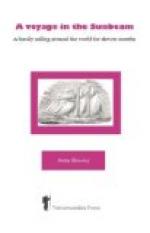Sunday, March 4th.—There is a fine cathedral at Shameen, in which the services are beautifully performed. A lady kindly lent us her house-boat, and after service we rowed across to Fa-ti, to see the gardens of Canton. They are laid out on an island a very short way up the river. The gardens are very wonderful, and contain plants cut into all sorts of shapes, such as men, birds, beasts, fishes, boats, houses, furniture, &c. Some are full-sized, others only in miniature. But almost all must have required considerable time and patience to reach their present growth, for their ages vary from 10 to 150 years. There are other plants not so elaborately trained, but the effect of the whole is rather too formal to be pretty. I managed to bring home some euphorbias, cut into the form of junks, and some banyan trees, one 100 and one 50 years old. I believe they are the first that have ever reached England alive and have flourished. Not far from Fa-ti are the duck-hatching establishments, and still further up the river are the duck-sampans, where the crowds of ducks are reared. They are sent out every morning to get their own living and return at night. Until they learn to obey their keeper’s call quickly the last duck is always whipped. I am told it is most ridiculous to see the hurry of the last half-dozen birds of a flock of some thousands of ducks. I was most anxious to see them, but it is not the right time of year now. The young ducks are only just beginning to hatch, and the old ones are not numerous, and are mostly laying.
There was no time to go and see the temple of Honan, for we were more anxious to avail ourselves of a chance of visiting some interesting places in the Chinese city. We went through a street, consisting entirely of fruiterers’ shops, to which the name of Kwohlaorn, or fruit-market, is applied. In this market, which is of great extent, there is for sale at all seasons of the year an almost countless variety of fruit.
A silkworm establishment was pointed out to us in the distance, but we did not go over it, as we had seen many before, and it is not the best season of the year. The silkworms are most carefully tended, the people who look after them being obliged to change their clothes before entering the rooms where they are kept, and to perform all sorts of superstitious ceremonies at every stage of the insect’s growth. No one at all ailing or deformed is allowed to approach a building where they are kept. The worms are supposed to be very nervous, and are guarded from everything that can possibly frighten them, as well as from all changes of temperature or disturbances of the atmosphere. Thunder and lightning they are supposed specially to dread, and great pains are taken to shelter them by artificial means, and keep them from all knowledge of the storm.
The next place we visited was a bird’s-nest-soup-shop street, where we went into one of the best and most extensive establishments. There were three or four well-dressed assistants behind the counter, all busily occupied in sorting and packing birds’ nests. Some of the best were as white as snow, and were worth two dollars each, while a light brown one was worth only one dollar, and the black dirty ones, full of feathers and moss, could be purchased at the rate of a quarter dollar.




